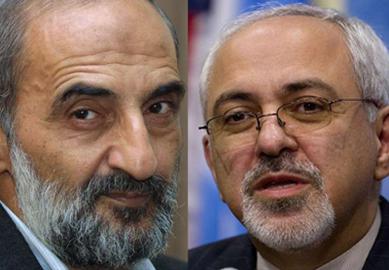
In the eyes of the West, Iranian Foreign Minister Javad Zarif's looming battle will be at the negotiating table in Geneva, when talks resume on the country's nuclear program. But for Zarif, the real pain has already begun at home in Tehran. His long-running political duel with the Hossein Shariatmadari, the hardline, stalking presence who runs Kayhan newspaper, erupted anew this week.
“This morning, after seeing the headline in [Kayhan], I felt a severe pain in my back and legs to the extent that I was unable to walk or even sit,” Zarif wrote on his Facebook page, in reaction to allegations Shariatmadari published, holding that Zarif called President Rouhani's phone call with Obama and his own meeting with John Kerry “missteps.”
The background to Kayhan newspaper is that it is far more than a newspaper. Though its editor, Shariatmadari, is a direct appointee of Supreme Leader Ali Khamanei, he has often moved aggressively beyond the leader's own policies. The paper's headlines have often functioned as an advance bulletin of who authorities will be arresting imminently, a veritable blacklist od a newspaper whose very name resonates for many Iranian politicians, activists, and intellectuals as a harbinger of fear.
Zarif, in his response, struck back against Shariatmadari's legitimacy as a mouthpiece for Khamenei. “Those who claim to be the followers of the Supreme Leader are in fact moving ahead of the Leader,” he said. “They don’t even think to themselves that the Supreme Leader would have already made his position clear if he deemed it appropriate.”
The Foreign Ministry struck back against the Kayhan account, but the newspaper used off the record comments from MPs after a meeting of the National Security and Foreign Policy Commission to bolster its account.
But in the trajectory of Zarif versus Shariatmadari, such tensions are nothing new. Back in February 2002, Kamal Kharazi, then foreign minister, agreed with Zarif to send him to New York as Iran’s representative at the United Nations and secured permission from Khamenei. Zarif writes about what happened in his memoris: "The leader told me “I told Mr. Hejazi the same day that you are the best candidate for New York... He was very kind to me... He also reminded me about some important points that I needed to keep in mind about that mission.”
But Kayhan was strongly against sending Zarif to New York, in Zarif's telling: “[Shariatmadari] wrote in the first page of his newspaper that despite the opposition of the senior officials, some elements inside the Foreign Ministry are trying to send Zarif to New York by resorting to secret maneuvers. He was forced to apologize the day after...I always say that I will not forgive the person behind this... I wonder what kind of sharia is this and what kind of believer he thinks he is, the man who refuses to apologize and asks for forgiveness from someone he had wrongly accused. [Shariatmadari’s] enmity and hostility with me has continued up until now."
The second challenge Kayhan launched against Zarif followed shortly after, later that spring in 2002. The newspaper ran a front page headline alleging that ‘the New York band’ in the Foreign Ministry, led by Zarif, had built an espionage station on Chalous Road whose its data went directly to Vienna, as part of the Comprehensive Test Ban Treaty. The paper also claimed this had been done without any coordination with state senior officials. Zarif writes about those difficult days: "Before noon Thursday, I went to the Foreign Ministry together with a colleague. We didn’t sleep until Friday noon trying to prepare a response for one of those reports.”
Based on the provisions of the Comprehensive Nuclear-Test-Ban Treaty, certain stations were to be installed on the soil of each member state with the capability of registering any possible nuclear test. Iran had some spying concerns with the use of those devices. Even Zarif and Cyrus Nasseri were also considering those concerns while coordinating the installation of devices. However, they finally signed the Protocol with the supreme leader's approval. The signing of the treaty was also passed by Iran’s Supreme Council for National Security.
"The next day and after receiving a call from the highest ranking state official, Kayhan was forced to write that what happened was done in coordination with the authorities", Zarif writes in his memoir.
The atmosphere that Kayhan wreaked havoc on Zarif's efforts to bring Iran into compliance with its international obligations. “Following the atmosphere created by Kayhan, one of the prominent politicians almost threw me out of a meeting of the Foreign Policy Commission of the parliament and told me ‘you have threatened the national security of the country by signing the C.T.B.T’, in an insulting tone”, Zarif recalls.
Zarif believes that spreading local disputes about this treaty “ignited the first spark of the misunderstanding and skepticism regarding Iran’s real intentions at the international level." He says: “The word betrayal is perhaps the only appropriate term that comes to my mind when judging such hue and cry." He also accuses his critics of being "ignorant, illiterate, vindictive and jealous".
The reciprocal accusations between Zarif and his critics, most prominently Hossein Shariatmadari, continue unabated. In its most recent issue, Kayhan daily has reacted to denial of its account on Zarif’s remarks at the Parliament. According to the daily: “Kayhan has received news from its reliable sources that the godfathers of compromise with America are exerting heavy pressuring to force [us] to deny our news. These pressures will be published if needed.”
visit the accountability section
In this section of Iran Wire, you can contact the officials and launch your campaign for various problems




















comments